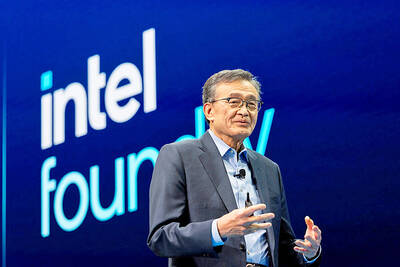Shares of heat-dissipation parts makers have generally outperformed the market this year, as investors are positive about their business outlook next year and believe that market demand will increase further as 5G adoption takes off.
Thermal modules are crucial, as they help dissipate heat and ensure normal performance of computers, smartphones, servers and vehicles, analysts said.
Good heat-dissipation systems, such as heat pipes and vapor chambers, have become increasingly crucial as electronic devices continually become lighter and slimmer, they said.
This year, Chaun-Choung Technology Corp (超眾) saw its shares surge 40.39 percent on the Taiwan Stock Exchange as the broader market slid 8.6 percent, while Auras Technology Co Ltd (雙鴻) rose 34.11 percent on the over-the-counter Taipei Exchange, where the benchmark TPEX retreated by 16.82 percent.
Over the same period, Jentech Precision Industrial Co (健策), Forcecon Technology Co (力致) and Taisol Electronics Co (泰碩) rose 17.24 percent, 11.92 percent and 7.53 percent respectively.
The sector has seen greater competition since last year, with the gross margins at most firms sliding, but Chaun-Choung stands out among its peers with vapor chamber products that have been adopted in high-end computers, gaming notebooks, flagship mobile phones and gaming handsets, Yuanta Securities Investment Consulting Co (元大投顧) said.
“Vapor chambers will be the company’s main growth driver,” Yuanta analyst Calvin Wei (魏建發) said in a research note on Thursday last week.
“With 5G construction to begin next year, vapor chambers should see even greater demand,” Wei said.
The company’s alliance with Japan’s Nidec Corp would help it focus on niche and high-priced product development to avoid price competition, Wei said.
The government-funded Industry, Science and Technology International Strategy Center (產科國際所) said next year would mark the beginning of the 5G era, with South Korea and the US taking the lead by launching commercial services based on 5G technology, which offer high-speed transmission and low data transmission latency compared with 4G.
As for consumer services, shipments of 5G handsets are likely to commence next year in small volumes and account for less than 1 percent of global handset shipments, Yuanta said.
Shipments would accelerate gradually in 2021 and 5G phones could account for 65 percent of total handset shipments in 2026, creating higher demand for heat-dissipation designs, due to the larger power consumption of 5G handsets, it said.
There are still no reliable statistics on the power consumption of 5G handsets, Wei said.
However, based on tests conducted by Huawei Technologies Co (華為), which is to launch the first 5G handset by the middle of next year, 5G smartphones could on average consume 10 watts to 15 watts, compared with less than 5 watts for 4G handsets, menaing that heat pipes or vapor chambers would increasingly need to replace graphite sheets, he said.
Demand for heat-dissipation parts would also be boosted by the need for 5G base stations, switches and servers, benefitting local players such as Chaun-Choung, Auras and Taisol, as well as Asia Vital Components Co (奇鋐) and Sunonwealth Electric Machine Industry Co (建準), he said.

Mercuries Life Insurance Co (三商美邦人壽) shares surged to a seven-month high this week after local media reported that E.Sun Financial Holding Co (玉山金控) had outbid CTBC Financial Holding Co (中信金控) in the financially strained insurer’s ongoing sale process. Shares of the mid-sized life insurer climbed 5.8 percent this week to NT$6.72, extending a nearly 18 percent rally over the past month, as investors bet on the likelihood of an impending takeover. The final round of bidding closed on Thursday, marking a critical step in the 32-year-old insurer’s search for a buyer after years of struggling to meet capital adequacy requirements. Local media reports

US sports leagues rushed to get in on the multi-billion US dollar bonanza of legalized betting, but the arrest of an National Basketball Association (NBA) coach and player in two sprawling US federal investigations show the potential cost of partnering with the gambling industry. Portland Trail Blazers coach Chauncey Billups, a former Detroit Pistons star and an NBA Hall of Famer, was arrested for his alleged role in rigged illegal poker games that prosecutors say were tied to Mafia crime families. Miami Heat guard Terry Rozier was charged with manipulating his play for the benefit of bettors and former NBA player and

TECHNOLOGICAL RIVALRY: The artificial intelligence chip competition among multiple players would likely intensify over the next two years, a Quanta official said Quanta Computer Inc (廣達), which makes servers and laptops on a contract basis, yesterday said its shipments of artificial intelligence (AI) servers powered by Nvidia Corp’s GB300 chips have increased steadily since last month, should surpass those of the GB200 models this quarter. The production of GB300 servers has gone much more smoothly than that of the GB200, with shipments projected to increase sharply next month, Quanta executive vice president Mike Yang (楊麒令) said on the sidelines of a technology forum in Taipei. While orders for GB200 servers gradually decrease, the production transition between the two server models has been

BETTER THAN EXPECTED: The firm’s Q3 results exceeded its projections, based on ‘the underlying strength of our core markets,’ chief financial officer Dave Zinsner said Intel Corp returned to profitability and gave an upbeat revenue forecast after PC demand grew, suggesting that it is making progress on a long and challenging comeback attempt. In the third quarter, revenue rose 3 percent to US$13.7 billion. The Santa Clara, California-based company posted its first quarterly net income since the end of 2023, with earnings per share of US$0.23, excluding some items. Analysts had estimated sales of US$13.2 billion and earnings per share of US$0.01 on average, according to data compiled by Bloomberg. Fourth-quarter sales would be roughly US$13.3 billion, the company said in a statement on Thursday. Intel shares gained about